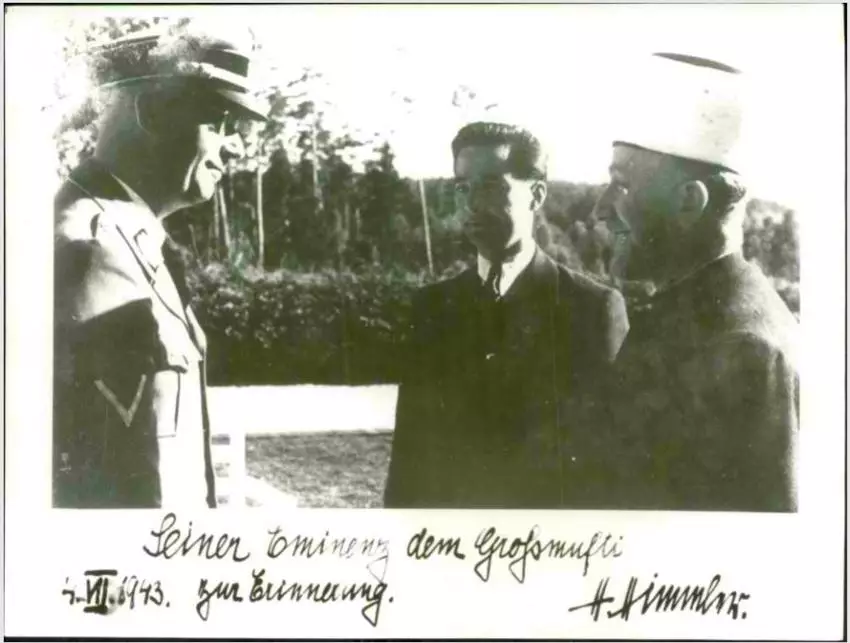In the first week of May 1945, as the third Reich approached unconditional surrender, the Palestinian leader and ex-Mufti of Jerusalem, Hajj Amin al-Husseini, fled the Austrian Mountain resort of Bad Gastein, leaving behind his personal papers, compiled since 1940. The US Army found the material, analysed and indexed it, and then archived it. They secretly shared it with the Israelis, but only released it to the public many decades later.
The Mufti was and remains notorious. Scholars often blame him for the Palestinian failure to achieve statehood. The Palestinian revolt of 1936-41, which he led hoping to reverse British support for Zionism, ultimately wrought disaster. He murdered Palestinian rivals and refused to compromise when the revolt was crushed, instead seeking refuge among Britain’s enemies. His ties to the Nazi SS made the principal Palestinian leader a war criminal by 1945.
This latter issue has dominated public discourse about the Mufti. Indeed, he helped raise Bosnian SS battalions and was therefore indicted by Yugoslavia at the United Nations War Crimes Commission. However, public figures in Israel have accused him of inspiring the Nazi Final Solution. His Nazi links are often held up by Israelis – unfairly, to be sure – as evidence that Palestinian national ambitions are inherently genocidal.
![Before they were Renegades: Grand Mufti of Jerusalem Hajj Amin al-Husseini (sitting, middle), Shakib Arslan (2nd from right) (Head of Syro-Palestinian Congress), and Hashem al-Atassi (leader of Syrian national Bloc, 2nd from left, sitting) at the 1934 Saudi-Yemeni peace conference. Online Museum of Syrian History [Public domain], via Wikimedia Commons](/research/Projects/images/Atassi-Husayni-and-Arslan-in-Saudi-Arabia.x19f2f932.jpg?q=70&f=webp) Before they were Renegades: Grand Mufti of Jerusalem Hajj Amin al-Husseini (sitting, middle), Shakib Arslan (2nd from right) (Head of Syro-Palestinian Congress), and Hashem al-Atassi (leader of Syrian national Bloc, 2nd from left, sitting) at the 1934 Saudi-Yemeni peace conference. Online Museum of Syrian History [Public domain], via Wikimedia Commons
Before they were Renegades: Grand Mufti of Jerusalem Hajj Amin al-Husseini (sitting, middle), Shakib Arslan (2nd from right) (Head of Syro-Palestinian Congress), and Hashem al-Atassi (leader of Syrian national Bloc, 2nd from left, sitting) at the 1934 Saudi-Yemeni peace conference. Online Museum of Syrian History [Public domain], via Wikimedia Commons
It's now possible to set the record straight. Researchers have lacked access to direct primary evidence about Husseini’s time in Germany and Italy during 1941-45. Lack of evidence has hampered research about Husseini’s aims, motives, and decisions. Most of what we know about him has derived from his own memoir, written decades later, compared against colonial archives.
Both of these sources can be problematic. However, Husseini’s personal archive was never weeded. It was never meant to be exposed to the public, and therefore it offers a rare, pure, look at the Mufti’s relations with Nazi Germany and Fascist Italy, other Palestinian leaders, and his views on the events of the war, and the future.
Using Husseini’s recently declassified letters and diaries, this project will settle the public debate about his relations with the Nazis.
 Left to right: Heinrich Himmler, head of the SS, with unknown and Amin al-Husseini, 4 July 1943. Credit – Israeli State Archives, Eichmann Papers. A/3149/16.
Left to right: Heinrich Himmler, head of the SS, with unknown and Amin al-Husseini, 4 July 1943. Credit – Israeli State Archives, Eichmann Papers. A/3149/16.
It will provide new answers to the question of Palestinian failure to achieve statehood. This grant will translate his archive to English, and will produce one or two journal articles on how he led Palestinian resistance during the Second World War, and contribute to a monograph on Britain’s decision to quit Palestine in 1947.
Meet the Principal Investigator(s) for the project
Dr Steven Wagner - I am an historian of intelligence, security, empire and the modern Middle East. Before coming to Brunel, I was a SSHRC postdoctoral fellow in the Department of History and Classical Studies at McGill University, Montreal. I received my DPhil from the University of Oxford, and my BA and MA from the University of Calgary. Since 2007, I have been looking at records declassified records in the UK, USA, and Israel which shed new light on the story of the Palestine Mandate, but also on the previously unknown role of intelligence in countering terrorism & insurgency, and in shaping British policy.
Qualifications:
DPhil – University of Oxford
MA – University of Calgary
BA – University of Calgary
Related Research Group(s)
International Law - Addressing the fields of public international law, from human rights law to refugee law, the laws of war, international criminal law and dispute resolution.
Intelligence and Security Studies - As an inter-disciplinary research centre, established to deal specifically with intelligence issues, policy and institutions, to promote and develop social science and policy-oriented approaches to intelligence.
Partnering with confidence
Organisations interested in our research can partner with us with confidence backed by an external and independent benchmark: The Knowledge Exchange Framework. Read more.
Project last modified 12/10/2023